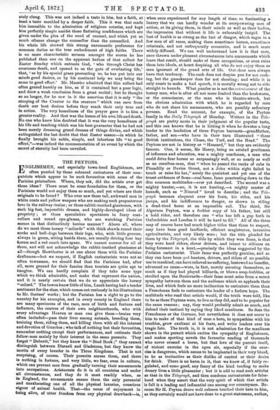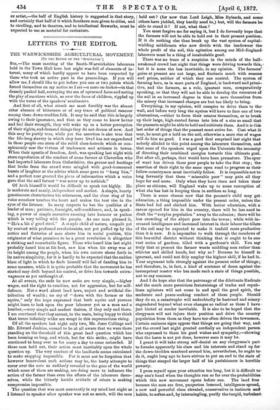THE PEYTONS.
ENGLISHMEN, and especially town-bred Englishmen, are often puzzled by those coloured caricatures of their com- patriots which appear to be such favourites with some of the Parisian printsellers. 1Vhere, they ask, did the artists ever get those ideas? There must be some foundation for them, or the Parisians would not enjoy them so much, and yet where are their originals b be found ? Who ever saw those tall, awkward men in white coats and yellow weepers who are making such preposterous love in the railway-trains ; or those rabbit-toothed giantesses, with such big feet, impossible dresses, and highly-developed ideas of propriety ; or those speculative spectators in fuzzy coat. collars and round eye-glasses, who are watching Parisian scenes in that distinctively bovine manner ? Above all, where do we meet those horsey " milords" with thick shawls round their necks and bull-dogs between their legs, who, with little grooms, always in green, sitting beside them, are usually driving four bay horses and a red coach into space. We cannot answer for all of them, and will not acknowledge the rabbit-toothed giantesses at all—though Hawthorne is at one about them with the Parisian draftsmen—but we suspect, if English caricaturists were not so often townsmen, we should find that the Parisians had, after all, more ground for their fancies than tourists are quite apt to imagine. We can hardly complain if they take some type which we think admirable, and make that represent the nation, and it is nearly certain that we do so appreciate the horsey "milord." The towns know little of him, Leech having had a tender sentiment for the class, which comes out curiously in his illustrations to Mr. Surtees' works ; but the Parisian has a right to go to the country for his examples, and in every county in England there are many specimens of the race, men of birth and fortune and influence, the centres of their own neighbourhoods, who with every advantage Heaven or man can give them—brains very often included—pass their lives among animals, breeding them, training them, riding them, and killing them with all the interest and devotion of Guachos ; who talk of nothing but their favourites, remember nothing except their performances, and estimate their fellow-men mainly by their interest in the same pursuits. They forget " Debrett," but they know the "Stud Book ;" they cannot distinguish between Disraeli and Gladstone, but they know the merits of every breeder in the Three Kingdoms. That is not surprising, of course. Their pursuits amuse them, and there is nothing in fortune, and very little, we fear, even in culture, which can prevent men from gradually turning their amusements into occupations. Aristocrats do it in all countries and under all circumstances, and they do it most readily when, as in England, the amusements ensure them the only perennial and unexhausting one of all the physical luxuries, conscious vigour of animal health. That—the sense of enjoyment in being alive, of utter freedom from any physical drawback—is, when once experienced for any length of time, so fascinating a luxury that we can hardly wonder at its overpowering men of action, at its giving them, in their minds as well as their bodies, the impression that without it life is unbearably insipid. The lust of health is as strong as the lust of danger, which rages in a few men of all races, making them sometimes heroes, sometimes criminals, and not unfrequently eccentrics, and is much more widely diffused. We can well understand how it is that men, once thrown under pleasant circumstances into amusements which leave that result, should make of them occupations, or even raise them into ideals, at heart despising all who do not enjoy them as men ignorant of the grand arts of life. Out-door men always have that tendency. The cook does not despise you for not cook- ing, but the gamekeeper does for not shooting ; and while it is only comic to make a bad speech, it is morally wrong not to ride straight to hounds. What puzzles us is not the entrainement of the horsey man, who is after all not more limited than the bookworm, or the connoisseur, or the man who is theatre-struck, but the obvious admiration with which he is regarded by men who do not share his amusements, who are possibly sedentary persons. Read the account, for example, of the Peyton family in the Daily Telegraph of Monday. Writers in the Tele- graph are pretty acute in their judgment of the popular taste, and this one knows that he is hitting it when he devotes a long leader to the laudation of three Peyton baronets—grandfather, father, and son—who have in their turn illustrated "those British institutions, the Chase, the Turf, and the Road," The Peytons are not in history or "Hansard," but they are evidently famous. One, it seems, Sir Henry, being an estated gentleman of influence and education, was a mighty coachman, a man who could drive four horses so surpassingly well, or so nearly as well as an omnibus-man, that "when he passed the ranks of cabs in Piccadilly or Davies Street, not a Jehu within sight failed to touch or raise his hat," surely the quaintest and yet one of the truest evidences of fame—real fame, fame penetrating down to the dim common multitudes—ever yet described. The second was a mighty hunter,—no, it is not huuting,—a mighty master of hounds, such as Nimrod " loved to describe ; and the Tele- graph becomes eloquent over his feats, his rides, and his jumps, and his indifference to danger, as shown in riding a dead-tired horse at an impossible rail. The third, Sir Algernon Peyton, was a feebler copy of his father, but still a bold rider, and therefore one "who has left a gap both in Oxfordshire and London it will be hard to fill." All of the three may of course have had much higher titles than these to respect, may have been good landlords, efficient magistrates, inventive agriculturists, and very likely were ; but the title pleaded for them by the Telegraph, the title by which they won fame, is that they were hard riders, clever drivers, and intent to silliness on being foremost in a hunt,—precisely the ideas suggested by the Parisian caricaturist. Their fame was perfectly genuine, and as they can have been grad hunters, drivers, and riders of no possible use to mankind, can have relieved no suffering, bestowed no benefits, advanced no cause—were, in fact, merely amusing themselves, as much as if they had played billiards, or blown soap-bubbles, or strolled upon the Boulevards—their fame must arise from a secret sympathy between them and the audience which so applauds their lives, and which feels no more inclination to caricature them than a Frenchman feels to caricature the leader of a forlorn hope. The multitude who read that article would, if the truth were told, like to be as these Peytons were, to live as they did, and to be popular for the same reasons ; nay, they would probably admit as much, and defend their instinct by saying they liked manliness. So does the Frenchman or the German, but nevertheless it does not occur to him to make of that kind of man a hero, to sympathise with his troubles, grow exultant at his feats, and write leaders over his tragic fate. The truth is, it is not admiration for the manliness shown in the pursuit which excites the sympathy of Englishmen, and makes sporting novels the favourite reading of thousands who never crossed a horse, but that love of the pursuit itself, of violent exercise in the open air, especially if the exer- cise is dangerous, which seems to be implanted in their very blood, to be as instinctive as their dislike of control or their desire for drink. There is no harm in it, that we know of, if fairly re- gulated, and some good, any fancy of the kind tending to make dreary lives a little pleasanter ; but it is odd to read such articles as that in the Telegraph, and then condemn caricaturists for false- hood when they assert that the very spirit of which that article is full is a leading and influential one among our countrymen. Be- cause Sir H. Peyton drove well cabmen touched their hate to him, as they certainly would not have done to a great statesman, author,
or artist,—the half of English history is suggested in that story, and certainly that half of it which Southern men given to cities, and to strolling, and to theatres, and to intellectual fireworks, must be expected to use as material for caricature.



































 Previous page
Previous page